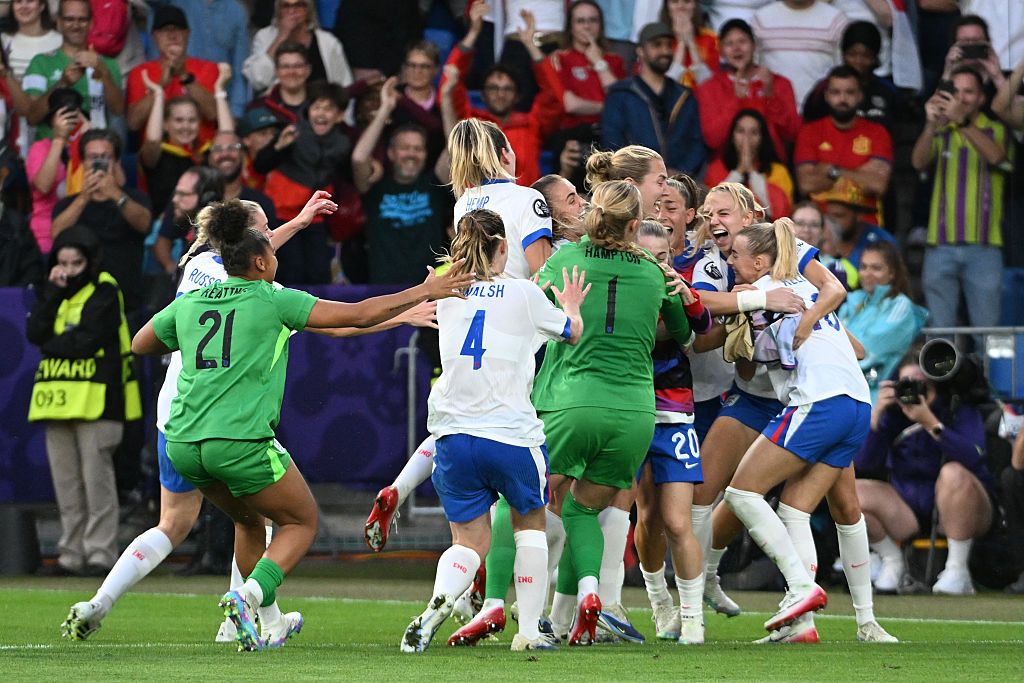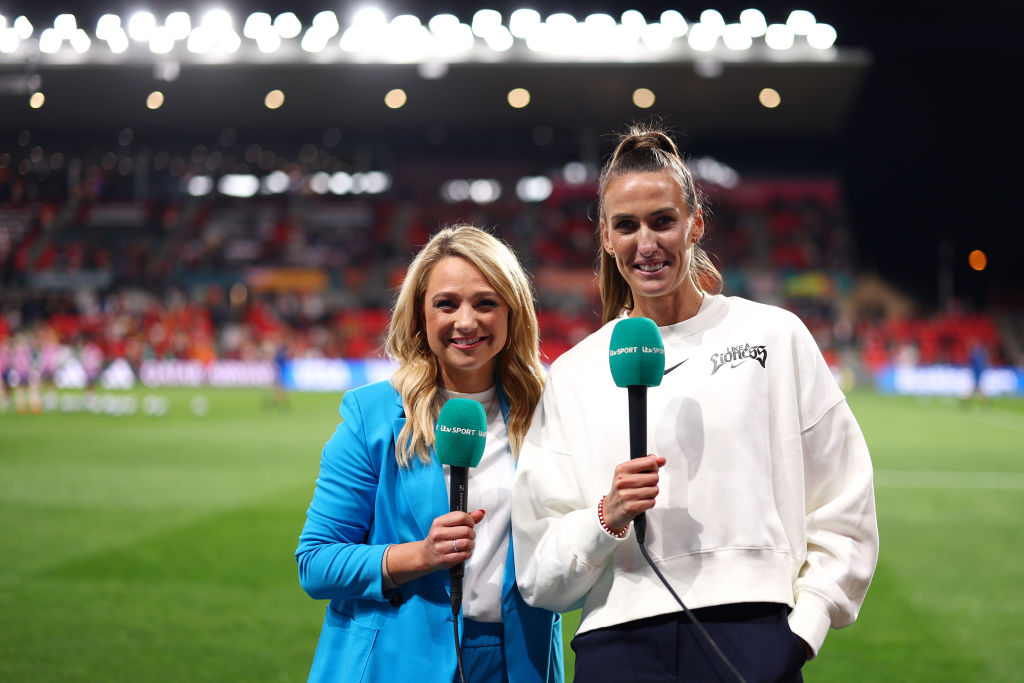
If you were ever in any doubt about the importance of the England women’s national football team, their triumphant win in the final of the UEFA Women’s Euros has made it undeniable. With pubs staying open late on Sunday and a jubilant Lionesses victory parade taking place in London today, the UK is celebrating a match declared of 'exceptional national significance' by the government.
To my 11-year-old daughter - who trains with a squad for promising youth players and has talked of becoming a Lioness since she was three years old - this all feels completely normal. She can't conceive of a world in which women don't play football. But for those of us who grew up in a different era, this feels like a watershed; a moment not just for football or even sport, but for women.
Sports broadcaster and former England hockey player Katie Shanahan has been the dedicated Lioness Reporter covering the Women's Euros for ITV. The England v Italy match was the most-watched ITV broadcast of 2025 so far, and the tournament has broken records as the highest-attended Women’s Euros ever, with over 600,000 fans in the stands. Katie spoke exclusively to woman&home from the team’s basecamp in Zürich, reflecting on what it was like to be pitch-side throughout the Lionesses' historic tournament - one that has now ended in glory, with England crowned champions and a victory parade taking place today.
“For years, women were banned from playing, so we lost all this enjoyment of the game,” Katie says. “Even a few tournaments ago, we weren’t selling out stadiums or reaching millions on TV. Imagine saying to the former Lionesses of 20 or 30 years ago that one day, a women's international semi-final would be watched by millions on TV, or that pubs would stay open late because of women’s football. It’s literally what dreams are made of.”
The Football Association banned women’s football from its grounds in 1921, declaring it 'unsuitable for females' - a ban that lasted for 51 years. In 2005, when England played their opening match in the UEFA Women's Euros, fewer than 1,000 fans turned out to support them. Contrast that with this year’s tournament, which shattered previous attendance records, becoming the most‑attended Women’s European Championship ever with a total of 657,291 fans attending all matches across the group stages and knockout rounds. The final, in which England defeated Spain, was not only the most-watched women's football match ever in the UK- with an audience of 22.1 million, surpassing the previous record of 17.4 million set during Euro 2022 - but also the most-watched televised event of 2025.
Katie, who played hockey for England at the highest level for five years, knows the thrill of international competition firsthand. She admits to missing her hockey career, but says witnessing the shift the Lionesses are bringing to the sporting landscape - and sharing it live with the nation - is the next best thing. She feels a responsibility not just to "get the answers the nation wants" after each match, but to tell the broader story behind the Lionesses’ triumph and the long road it took to get here.
"I also feel it's my role to tell their stories in the best possible way - to get the best out of them and to deliver the best coverage," she says. "I think we owe it to the women's game. It's going from strength to strength, and I feel very responsible to keep growing and taking it to new heights," she says.
It’s a weighty responsibility - because for girls like my daughter, the Lionesses are no longer just role models; they’re champions, living proof that they can be anything. And for women of my generation, their self-belief is nothing short of awe-inspiring.
"Take Michelle Agyemang - less than four years ago, she was a ball girl, watching from the sidelines during Sarina Wiegman's first game in charge of England," Katie says. “Now she's helping put them into a major tournament final. She told me she only needs 10 seconds to change a game, and she’s proved it."
Throughout the tournament, the Lionesses' off-pitch lives have also captured attention, shining a light on the broader story of who they are, what they represent, and how far they’ve come. Their personal rituals and routines have helped young fans connect with them in meaningful ways. Chloe Kelly’s shin pads, for example - decorated with photos of her husband and their two dogs - are always carefully laid out in the “pristine” dressing room before each match, Katie tells us.
These intimate glimpses into their world make them even more relatable for young girls like my daughter. (She sat in on my interview with Katie, and when she asked her what the Lionesses eat for breakfast - lots of eggs and plenty of protein if you're curious - I realised just how different her world is from the one I grew up in. We didn't talk about female footballers, never mind think to ask them for nutrition tips.)
"Michelle Agyemang brought out a piano - she plays every single day to relax. They even brought their own barista to basecamp, and he’s got a dog, so they called him the coffee dog,” Katie laughs. “And I’ve got to tell you - the dressing room playlist is amazing. They've got Vindaloo, Sweet Caroline - just everything. I need this playlist, it’s so, so good. Then they come out of the dressing room high-fiving each other until the tunnel… and then, silence. So composed. So calm.”
The post-match atmosphere, though, is something else entirely. “After the Italy game, there was an absolute party in the dressing room,” Katie says. “They were singing and banging on the desks, Freed From Desire was blasting, and I’m trying to interview Sarina. I’m like - can you tell them to stop?”
Recently, Katie has looked back at interviews with former England players and been reminded of what they went through - "all the sexism and misogyny" - to pave the way for today's Lionesses. "Journalists used to ask players, 'What does your husband do?' and 'Who's looking after the children?'" Katie explains. "I think that's a real testament, not only to the former Lionesses and their resilience and perseverance to continue growing the game, but also to the Lionesses of today to maintain that legacy."

The current Lionesses’ journey to this historic win hasn’t been without pain. Defender Jess Carter faced racial abuse during the tournament - a moment that tested not just the individual but the entire squad. In a powerful public statement, manager Sarina Wiegman condemned the abuse as “ridiculous and disgusting,” calling it a moment to “send a message to the world.”
“Georgia Stanway told me they’re exposing their vulnerabilities in this tournament - not only on the pitch, but off it as well,” Katie adds. "We’re seeing that in those huge moments where they have to dig really deep and find belief from somewhere - in the last kick of the game, or during nerve-wracking penalty shootouts. And we're also seeing it off the pitch with Jess going through something no player should ever have to experience - just abhorrent behaviour. But I think that France game, that moment of adversity, really brought them together."
While there’s still more work to do before the women’s game is seen on an equal footing as the men’s, Katie feels this tournament's coverage has begun to reflect the quality of play on the pitch. With that, she believes, comes a responsibility to apply the same interview standards to male and female players. "If we want true equality, we have to analyse the game the same way we do for men," Katie explains. "I always think: 'Is this fair? How would I ask Harry Kane this?' We need the same criticism and quality analysis we see in the men’s game."
As the Lionesses lift the trophy today, their back-to-back Euros win marks a first in English football history - male or female. It’s a defining moment not just for sport, but for women everywhere. For Katie, this is deeply personal. “I know the girls well, Serena and I have a wonderful relationship, and I feel like I’m on this journey with them. It reminds me of what I miss about playing hockey - the energy, the bond, the buzz,” she says. “But this is the next best thing. These players inspire me to go home and put some of that inspiration into my own life.”
That’s a sentiment many of us share. Because while today’s parade is another history-making moment for the Lionesses, it also represents something even bigger. It’s not just about greater visibility for women in sport, or even pubs staying open in recognition that the women's game constitutes a moment of exceptional national significance. It's about reclaiming spaces that women were once shut out of.
“If they can win back-to-back Euros, and do what no England team, male or female, has ever done - win a major tournament overseas - just think what that means for the game,” Katie says.
Now, she believes, we can finally start making up for those 51 years of lost time.
What time is the Lionesses victory parade?
The England women’s football team will be celebrated in a public homecoming event today, Tuesday, 29 July. The open-top bus procession begins on The Mall in London at 12:10 pm BST, carrying the players into central London. The procession is expected to reach the Queen Victoria Memorial at approximately 12:30 pm where a ceremony hosted by Alex Scott will take place. The celebration will be broadcast live on BBC, ITV and Sky between 12:00 and 1:00 pm.







